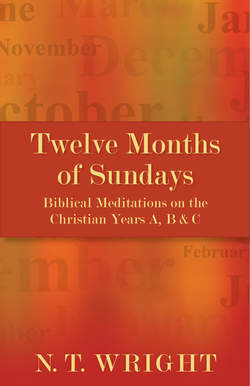Читать книгу Twelve Months of Sundays - N.T. Wright - Страница 17
На сайте Литреса книга снята с продажи.
ОглавлениеThe First Sunday of Epiphany
Isaiah 42.1–9
Acts 10.34–43
Matthew 3.13–17
John’s baptism can easily seem a mere introduction, the soon-to-be-forgotten starting point. The early Church clearly didn’t see it like that, since John continues to haunt the story in all four Gospels and Acts. This wasn’t just surreptitious polemic against John’s continuing followers. It was positive: John was the heaven-sent prophet through whom the Messiah was to be revealed. Mentioning him reinforces Jesus’ messiahship.
This is particularly striking in the Cornelius story. Peter, speaking to a Gentile, makes no attempt to de-Judaize his message. It is essentially a messianic statement, as indeed the title ‘Jesus Christ’ in v. 36 indicates: Jesus is the anointed one, whose works of healing were the signs that ‘God was with him’ (a phrase used of David among others). The resurrection demonstrates that Jesus’ death was messianic, despite appearances; and now this Jesus is to be judge of living and dead, the dispenser of divine forgiveness. All of this sustains the claim that Jesus, the Messiah, is Lord of all the world – a title which, as Cornelius would recognize, was claimed by his own boss. There lies the true challenge to the non-Jew: to see the Jewish king as the world’s true Lord.
The story of Jesus’ baptism in Matthew’s Gospel, therefore, is both a further challenge to Herod – here is God anointing his true king under the nose of the old one, somewhat like Samuel anointing David with Saul still on the throne – and the beginning of the confrontation with, as well as the welcome for, the whole world. It explains why the foreign kings (if that’s what they were) brought him gifts. It explains why another centurion, in Matthew 8, knows that he possesses authority. If he is the anointed Messiah, he is Lord of all. The mere announcement of this messiahship, as Acts 10 bears witness, is the thing that carries the power of the Spirit. It declares that Israel’s God has brought his people’s long story to its strange moment of truth. The whole world is now to be addressed by the one who is both Israel’s representative and God’s own son (‘Son of God’ is a messianic title before it is a trinitarian one).
But the large agenda set before the servant-Messiah in Isaiah 42 is accomplished only by implication in the Gospels. Matthew clearly believed that Jesus fulfilled Isaiah 42, and that his death was the primary achievement of the task there set out. But if he knew in his day that the good news still needed to be carried to all the nations, would he not say in ours too that ‘the coastlands [still] wait for his teaching’ (42.4)? If it is true that the Messiah will not faint or be discouraged until he has established justice in the earth, how is that steady, tireless programme to be implemented by those who, today, claim to be anointed by his own royal Spirit to proclaim him as Lord of all?
